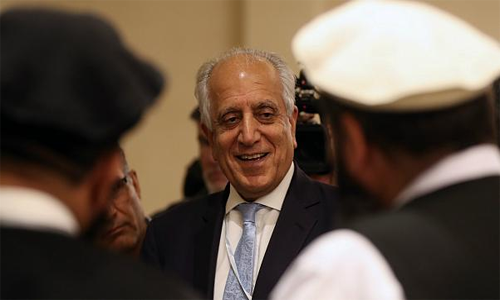As reports quotes from the US Special Representative for Afghanistan Reconciliation Zalmay Khalilzad, no notable progress achieved in the talks with Taliban. This comes after a long negotiation between the US and Taliban which initially created a log of optimism in the country. Once it was on the brink of an agreement announcement in September 2019 when President Donald Trump abruptly declared the process “dead”, citing Taliban violence. However, the US Special Representative for Afghanistan Reconciliation Zalmay Khalilzad still seems hopeful for reaching an agreement with them on a reduction of hostilities without offering any time frame. “We are waiting for a clear answer from the Taliban for a ceasefire or lasting reduction in violence based on a working mechanism which is acceptable to the people of Afghanistan and the US government,” the local report quoted Khalilzad.
This also comes after long disputes over the “violence reduction plan or complete ceasefire”. The Ghani’s critics and political rivals have been accusing him for trying to hinder the talks with the Taliban in order to retain his power. On the other hand, Taliban had repeatedly rejected the talks with the government of Afghanistan. With looking back at the past, the current approach will not bring peace unless the Afghan government, the Afghan people, and the Taliban--among themselves, regional and international actors-- and the US reach an agreement on peace. Therefore, we need to a serious pathology from the past so as to learn lessons for the future and make the process more comprehensive for a sustainable peace in the country.
As aforementioned, in the begging of peace process there were lots of optimisms even many of the political leaders rushed to Islamabad and Moscow thinking peace was not so far away. In addition to the mistakes made by the political leaders, it seems that Mr. Khalilzad has also made some mistakes in the Qatar talks that can be described as strategic mistake by the US Special Representative. It was very happy news when President Trump had not only signed the Mr. Khalilzad’s agreement with the Taliban but also counted a dead deal terminating it forever. Otherwise, signing such as agreement was a major disaster for Afghanistan and the United States. In fact, the agreement was the product of strategic mistakes that occurred during a sympathetic talk between Khalilzad and Taliban in Qatar.
The first mistake of Mr Khalilzad in Qatar long peace talks with the Taliban was that he did not pay importance to the position and presence of Afghan government in these talks. The root cause of Mr Khalilzad’s negative attitude towards the Afghan government is still unclear though many speculations have been raised. The absence of Afghan government and people who are in the center of conflicts with everyday killing dozens of men, women and children are not justifiable. As Afghanistan is in the center of crisis and conflicts, the Afghan government, as a legal entity, must be at the center of peace talks playing its key role in the peace process. It is true that there are some problems within the system and the duality of government leadership has brought a lot of problems to the fledgling Afghan system, but this cannot be the cause to neglect or marginalize the Afghan government.
The second strategic mistake of Mr Khalilzad was giving mush importance to the Taliban. The Taliban gained enough legitimacy during the Qatar talks turning from a terrorist group into a political and diplomatic group. Based on the probable agreement that was supposed to be signed at the David Camp by the US president, the Taliban was referred to as “Islamic Emirate” while it espouses the concept of a political system and government. The main point of such an agreement with United States was signing an agreement with a political system in absence of a legitimate government. Although Taliban was exiled, it had a legal and acceptable personality in political equations. The Taliban not only stabilized itself as a state and political system in the Qatari negotiations, but it also became a spurious position in some ways. For this reason, over the past year, the representatives of the group have repeatedly stressed that they should choose who they negotiate with and who they do not wish to negotiate with. Based on this attitude, the Taliban has so far refused to talk to the Afghan government and has refused to do so.
Currently, it seems that the second round of talks which began after the initial agreement cancellation by President Trump faced with ambiguity. This problem can be changed to a serious to a stalemate to the peace process and dialogue between the two sides, especially if the same mistakes of the past are repeated. Despite some internal challenges, the Afghan government can play a positive and decisive role in the peace process ensuring that any agreement is implemented. The release of two US university professors from the clutches of the Taliban in exchange of three Taliban leaders was a clear example of the Afghan government’s capacity in the peace process. Thus, the peace agreement between government and Hekmatyar was another unique experience happened during the report card of national unity government. It is hoped that no further talks are run in the absence of the Afghan government which is considered as a legitimate representative of Afghan people. In the meanwhile, the importance of each warring sides must be assessed on the basis of its legal and political weight in the peace process.
Home » Opinion » The Pathology of Afghan Peace process
The Pathology of Afghan Peace process
| Mohammad Zahir Akbari

